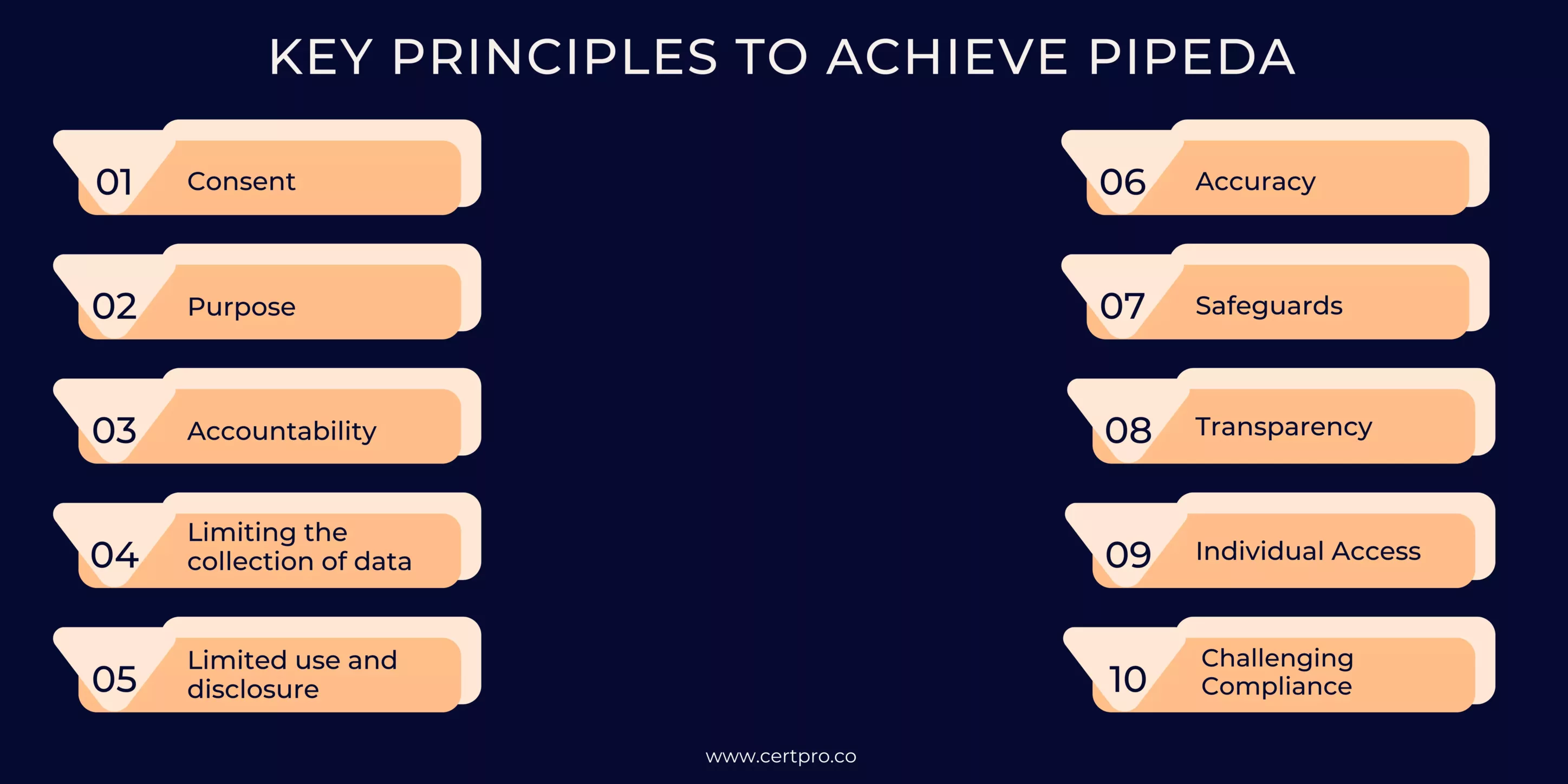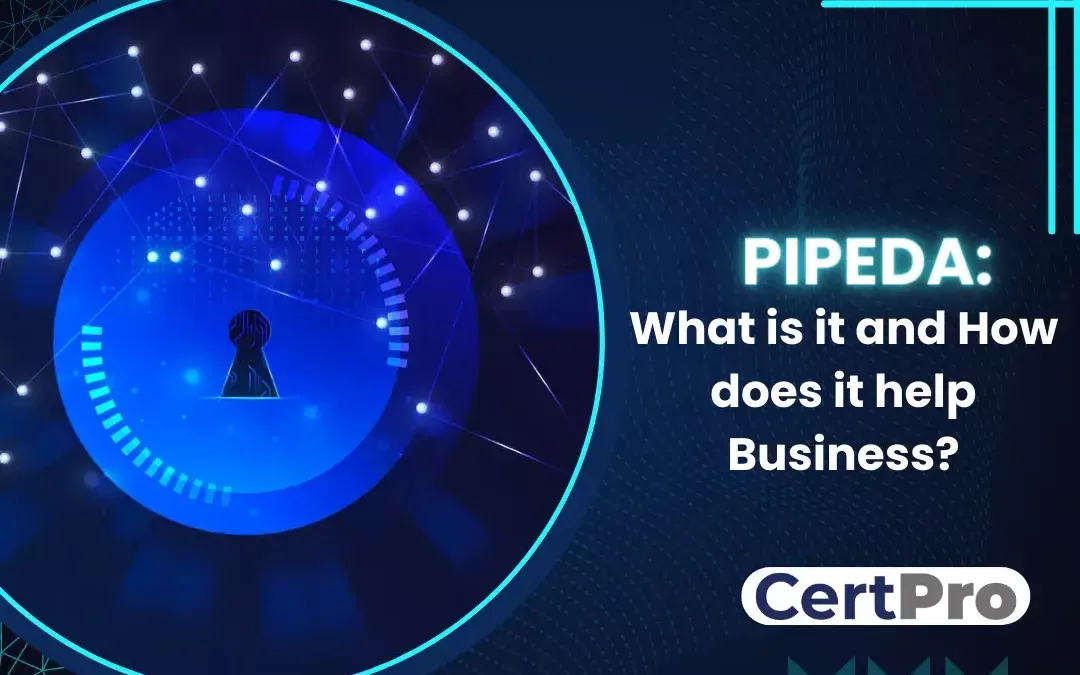The Personal Information Protection and Electronic Documents Act (PIPEDA) came into existence in the year 2000. It is an instance of data privacy legislation from Canada. This law controls how the private sector uses the personal information of Canadian residents. Additionally, it also includes a number of provisions for using electronic documents.
This article is for purely informational purposes, and we will be discussing the scope of PIPEDA, its key tenets, and the responsibilities organizations should follow in order to be compliant with PIPEDA. This article also sheds light on the role of the Office of the Privacy Commissioner of Canada.
WHAT IS PIPEDA?
The purpose of this law is to set guidelines for the gathering, handling, and dissemination of personal information by Canadian private sector organizations. The PIPEDA seeks to find a balance between safeguarding people’s rights to privacy and allowing businesses to utilize such information for lawful commercial purposes.
PIPEDA laws are similar to the EU’s General Data Protection Regulation (GDPR). Currently, PIPEDA is considered to offer an almost identical level of privacy protection to the EU, allowing for the free transfer of personal data from the EU to Canadian organizations.
WHO DOES IT APPLY TO?
Compliance with PIPEDA is most important to organizations that maintain and store the personal data of individuals and protect the data in order to gain customer trust in the company.
On an important note, it does not apply to government organizations or non-commercial activities.
KEY PRINCIPLES WHICH HELPS TO ACHIEVE PIPEDA
1. Consent: Organizations must give individuals clear and intelligible information about the reasons why their personal information is being collected, used, or disclosed in order to get permission under PIPEDA. People should be given this information in a way that enables them to decide for themselves whether or not to grant consent.
2. Purpose: The Personal Information Protection and Electronic Documents Act establishes guidelines for the purpose-driven acquisition, use, and disclosure of personal data by organizations. It guarantees that businesses only gather and use personal information for certain authorized purposes and that people are made aware of these objectives.
3. Accountability: Organizations are in charge of adhering to PIPEDA and are required to put in place procedures and policies to safeguard the personal data they are in charge of.
4. Limiting the collection of data: Personal information should only be used, disclosed, or maintained for as long as is required to achieve the goals for which it was obtained.
5. Limited use and disclosure: Organizations make sure that personal information is managed in a way that respects privacy rights and prevents its misuse by adhering to the concepts of limited use, disclosure, and preservation. This idea aids in reducing the dangers connected to illegal access, inappropriate applications, or the extended keeping of personal data.
6. Accuracy: The integrity and dependability of personal information are maintained by ensuring accuracy. Inaccurate or out-of-date information can result in mistakes, misinterpretations, or unfavorable outcomes for people. Organizations that place a high priority on accuracy strive to provide people with reliable services, support their decisions with accurate information, and maintain the confidence and trust of individuals whose information they handle.
7. Safeguards: Safeguards are the procedures and policies used by companies to guard against illegal access, use, disclosure, or destruction of personal data. The security and confidentiality of personal information must be guaranteed, and safeguards play a critical role in this process.
By implementing robust safeguards, organizations demonstrate their commitment to protecting personal information and maintaining the privacy and trust of individuals. Safeguards are essential for mitigating risks and preventing unauthorized access, use, or disclosure of personal information, thereby safeguarding the privacy rights of individuals.
8. Transparency: Transparency is the key principle that the organization has to maintain. It places a strong emphasis on openness and the requirement that businesses be transparent about their privacy practices and policies. It makes sure that people can find out how their personal information is gathered, utilized, and released.
9. Individual Access: People have the right to access the personal data that organizations have on them. Organizations must give people access to their personal information and let them know how it has been used or shared upon request. People can check the information’s veracity and ask for revisions if they discover it to be false, incomplete, or out-of-date.
10. Challenging Compliance: If an individual thinks their privacy rights have been breached, they have the right to contest a company’s adherence to the PIPEDA.
The Office of the Privacy Commissioner of Canada, which has the power to look into complaints, settle disputes, and make recommendations to organizations, is where they can register a complaint. The Commissioner serves as an impartial oversight body to make sure businesses follow PIPEDA’s standards and principles.
By abiding by these guidelines, businesses may strengthen customer relationships, give privacy protection first priority, and conduct themselves with respect and responsibility as the data privacy landscape changes. In the end, PIPEDA is crucial for defending individuals’ rights to privacy, fostering their independence, and encouraging the ethical use of personal data in the digital era.

BENEFITS OF PIPEDA
- Privacy Protection: The PIPEDA creates a framework for safeguarding the confidentiality of personal data. It establishes precise guidelines and standards that businesses must adhere to in order to ensure the appropriate acquisition, use, and disclosure of personal data while advancing people’s right to privacy.
- Consent and Control: Before collecting, using, or disclosing a person’s personal information, PIPEDA emphasizes the value of getting that person’s informed consent. As a result, people have more control over their data and are better equipped to decide how their information is handled.
- Trust and Confidence: PIPEDA increases trust and confidence between people and organizations by offering a thorough privacy framework. Knowing that their personal information is being handled properly and in compliance with established privacy rules might make people feel more safe.
- Individual Rights: The PIPEDA provides significant rights to individuals, including the ability to access their personal information, ask for repairs, and question a company’s adherence to the legislation. This gives people the freedom to manage their own data and take legal action when their privacy rights are abused.
- Business Reputation: Adhering to PIPEDA requirements may improve an organization’s standing and foster client confidence. Gaining clients that respect privacy-conscious businesses may be facilitated by demonstrating a commitment to privacy protection and appropriate data processing.
In order to safeguard people’s privacy and control how private sector businesses in Canada acquire, utilize, and disclose their customers’ personal information, the PIPEDA was implemented. Given the growing significance of data privacy, it is crucial for enterprises to be aware of their PIPEDA requirements, put in place the necessary measures, and keep up with changes to privacy legislation and industry best practices. Organizations may gain the trust and loyalty of their clients by emphasizing the protection of personal information and observing PIPEDA while also helping to create a more privacy-conscious digital environment.
FAQ
How does PIPEDA help businesses?
Are there any PIPEDA exceptions?
Does the PIPEDA comply with global privacy standards?
Does PIPEDA apply to the personal information of employees?
Does the PIPEDA regulation cover nonprofit organizations?

About the Author
SHREYAS SHASTHA DRUPADHA
Shreyas Shastha Drupadha, a Senior Business Consultant. Serving as an ISO 27001 Lead Auditor, Shreyas ensures the establishment of robust information security management systems. His expertise also encompasses GDPR, HIPAA, CCPA, and PIPEDA implementation.
HOW DOES THE NIST CYBERSECURITY FRAMEWORK FUNCTION, AND WHY IS IT IMPORTANT?
Emerging cyber threats make cybersecurity an essential consideration for organizations handling and managing data. In this regard, the NIST cybersecurity framework applies to improving your cybersecurity program. It is a set of guidelines that helps improve your...
UNDERSTANDING ISO 42001: A GUIDE FOR RESPONSIBLE AI MANAGEMENT SYSTEMS
The invention of artificial intelligence (AI) has changed the operational processes of many industries. However, the rapid growth of technology increases ethical, security, and privacy-related concerns. Therefore, the International Organization for Standardization...
EUROPEAN UNION’S ARTIFICIAL INTELLIGENCE ACT: HOW THIS GROUNDBREAKING LAW AFFECTS YOUR BUSINESS
Nowadays, Artificial Intelligence (AI) is transforming our lives exceptionally well. AI is now streamlining healthcare services, providing virtual assistance, and fulfilling queries. Technologies have boons and curses. Similarly, AI creates many concerns about...




